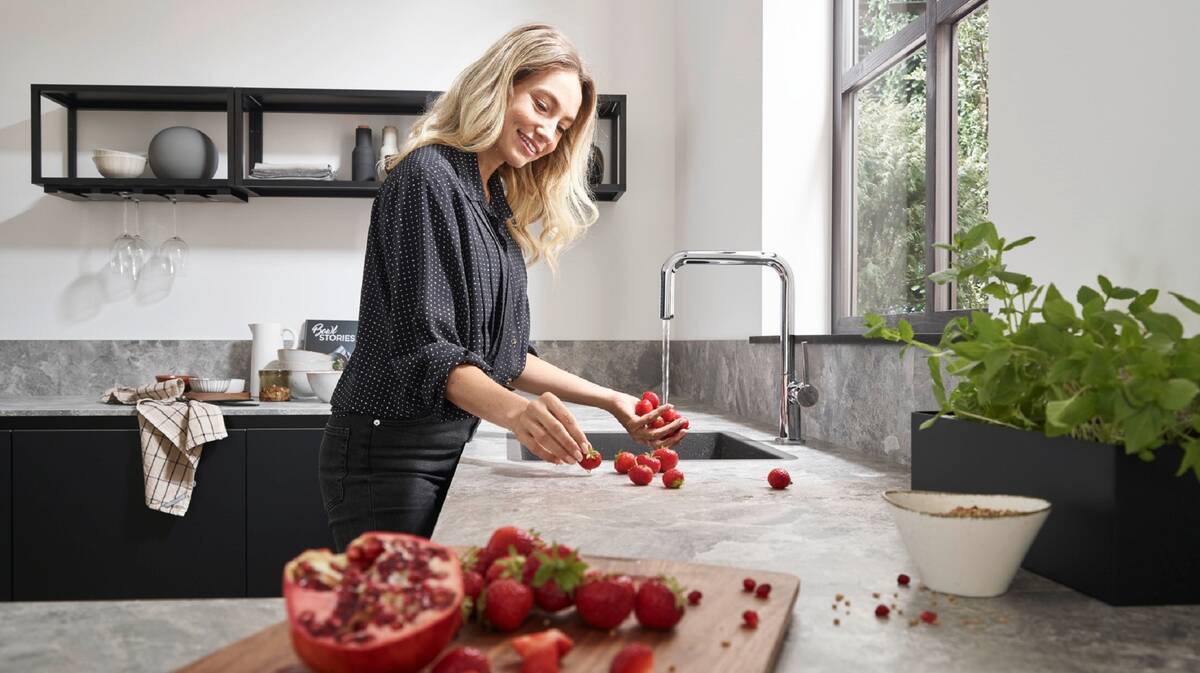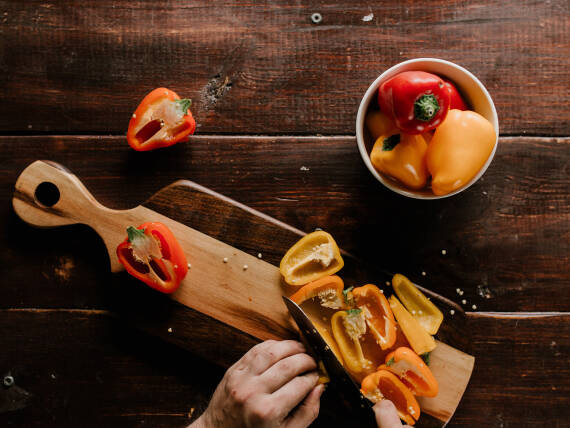Tips for flawless hygiene in the kitchen
Hygiene in the kitchen: 8 tips for clean food handling
The classic: You use the same knife to cut raw chicken and chop the ingredients for your salad. One moment of inattention like this can have dire consequences for your health. Anyone who has ever had an upset stomach or food poisoning can surely empathise here. Ensuring excellent hygiene in the kitchen is therefore extremely important. Read our practical recommendations for cleanliness and learn how to kill off bacteria with the right surface coating here.

8 key hygiene rules for the kitchen

The kitchen worktop’s cleanliness and hygiene mainly depends on our behaviour. So we advise you to note the following eight tips on handling food and preparing and cooking meals.
1) Wash your hands before you start cooking
You should always wash your hands before cooking to prevent bacteria transferring from the table or the change in your wallet to your food. And if you want to handle other foodstuffs after preparing ingredients that could upset your stomach, such as raw meat or eggs, you should wash your hands again. The aim of this is to prevent the transmission of salmonella and other bugs.
2) Always wash kitchen equipment thoroughly
Always use separate wooden spoons and other utensils for raw ingredients and ingredients that need to be cooked. This will prevent bacteria and flavours from unintentionally transferring to other dishes.
3) Keep everything clean and tidy
After cooking, frying and baking, it’s time to tidy up. Not only does this create a pleasant atmosphere, but it also makes it difficult for food moths and other pests to access your food.
4) Clean cutlery and crockery at high temperatures
To keep bacteria at bay, wash everything in hot water (at least 60 degrees).
5) Store raw food and cooked meals separately
Keep one shelf in the fridge for cooked meals, another for raw food. This will prevent bacteria, e.g. salmonella, from transferring from the raw ingredients to the cooked dishes.
6) Follow the cold chain rules for deep-frozen food
Even if it’s only slightly thawed, frozen fish can soon spoil. So make sure that the cold chain between purchasing and storing frozen food is not interrupted, if possible.
7) Always be aware of the dates on packaged food
If the expiry date for flour has passed, you don’t need to worry too much. It will still be edible. But when it comes to animal products, you should always keep an eye on the best-before and use-by dates.
8) Keep pets out of the kitchen as much as you can
Kitchen hygiene rules should also apply to dogs and cats. They can also carry diseases, which is why they should not get too close to food and crockery. Not to mention pet hair, which isn’t very appetising when found in food.
Always on top of it: Get your worktops coated
In addition to the prevention measures you need to bear in mind every time you cook, you can also improve and be more thorough with the hygiene in your kitchen: When selecting your worktop, opt for an antibacterial coating.
It goes without saying that you should regularly clean and wipe the worktop with a cloth. But if the bacteria are sitting in the dish cloth, what’s the point?
You can also have your worktop retreated by having an antimicrobial hygiene coating applied to the kitchen worktop, or even the shelves and kitchen unit fronts. When choosing the treatment, make sure it is definitely food safe. We recommend contacting an expert for advice here.
It’s all in your hands: These simple tips will help with good kitchen hygiene
When designing a new kitchen, you can ensure enhanced hygiene standards by choosing an antimicrobial coating for your worktop. If you then also follow the most important hygiene tips, you will definitely be OK when working with fruits, vegetables and meat.
Frequently asked questions about hygienic cooking and frying
Regular cleaning with a cloth is the number one rule. Worktops with an antibacterial coating ensure even more hygiene in the kitchen.
Cutlery, crockery and other cooking utensils should be cleaned using soapy water at a temperature of at least 60 degrees. This will ensure all bacteria is killed off.
If you are handling raw animal products, you must keep them separate from the ingredients you want to eat raw. This will stop you from contaminating these foods with bacteria such as salmonella.
Store cooked and uncooked food on different shelves so that bacteria cannot transfer to cooked meals.
Trusted partners